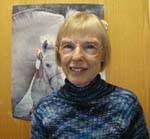Valerie Anne Galton, PhD

Title(s)
Emeritus Professor of Physiology and Neurobiology
Department(s)
Physiology and Neurobiology
Education
U. London, BSc. 1955
U. London, Ph.D. 1958
Programs
Program in Experimental and Molecular Medicine
Contact Information
Geisel School of Medicine
HB 7700
1 Medical Center Drive
Lebanon NH 03756
Office: Borwell 726W
Phone: 603-650-7735
Fax: 603-650-6130
Email: val.galton@dartmouth.edu
Professional Interests
For many years, Dr.Galton has investigated the pre-receptor regulation of thyroid hormone (TH) action in the developing brain. TH is essential for normal brain development and it is widely believed that 3,5,3’ -triiodothyronine (T3), which is generated within the brain from the major circulating hormone thyroxine (T4) by the type 2 deiodinase (D2), is responsible for TH action in this organ. However, following up on her previous findings Dr. Galton is currently testing the hypothesis that T4 is more than a pro-hormone. She is using a unique transgenic mouse that can neither synthesize TH nor convert T4 to T3. This mouse does not survive unless given exogenous T3. Dr. Galton is determining whether it will survive when given T4 and if so does T4 just mimic the effects of T3 in the brain and liver or does it have some unique effects of its own.
Grant Information
R21 HD072526-01 04/01/12-03/31/15
Principal Investigator V.A.Galton
Is Thyroxine more than a Prohormone?
Courses Taught
Medical Physiology 120 (Endocrine section)
Physiology 115 Advanced Endocrine Physiology.
PEMM 101 First year core course
PEMM 271. Advanced Systems Biology
Selected Publications |
|
Schneider MJ, Fiering SN, Thai B, Wu SY, St Germain E, Parlow AF, St Germain DL, Galton VA. Targeted disruption of the type 1 selenodeiodinase gene (Dio1) results in marked changes in thyroid hormone economy in mice. Endocrinology. 2006;147:580-9. (view details in PubMed) Galton VA, Wood ET, St Germain EA, Withrow CA, Aldrich G, St Germain GM, Clark AS, St Germain DL. Thyroid hormone homeostasis and action in the type 2 deiodinase-deficient rodent brain during development. Endocrinology. 2007;148:3080-8. (view details in PubMed) Galton VA, Schneider MJ, Clark AS, St Germain DL. Life without thyroxine to 3,5,3'-triiodothyronine conversion: studies in mice devoid of the 5'-deiodinases. Endocrinology. 2009;150:2957-63. (view details in PubMed) Ng L, Hernandez A, He W, Ren T, Srinivas M, Ma M, Galton VA, St Germain DL, Forrest D. A protective role for type 3 deiodinase, a thyroid hormone-inactivating enzyme, in cochlear development and auditory function. Endocrinology. 2009;150:1952-60. (view details in PubMed) Morte B, Ceballos A, Diez D, Grijota-Martínez C, Dumitrescu AM, Di Cosmo C, Galton VA, Refetoff S, Bernal J. Thyroid hormone-regulated mouse cerebral cortex genes are differentially dependent on the source of the hormone: a study in monocarboxylate transporter-8- and deiodinase-2-deficient mice. Endocrinology. 2010;151:2381-7. (view details in PubMed) Bassett JH, Boyde A, Howell PG, Bassett RH, Galliford TM, Archanco M, Evans H, Lawson MA, Croucher P, St Germain DL, Galton VA, Williams GR. Optimal bone strength and mineralization requires the type 2 iodothyronine deiodinase in osteoblasts. Proc Natl Acad Sci U S A. 2010;107:7604-9. (view details in PubMed) Liao XH, Di Cosmo C, Dumitrescu AM, Hernandez A, Van Sande J, St Germain DL, Weiss RE, Galton VA, Refetoff S. Distinct roles of deiodinases on the phenotype of Mct8 defect: a comparison of eight different mouse genotypes. Endocrinology. 2011;152:1180-91. (view details in PubMed) Buitendijk M, Galton VA. Is the kidney a major storage site for thyroxine as thyroxine glucuronide? Thyroid. 2012;22:187-91. (view details in PubMed) Galton VA, Hernandez A, St Germain DL. The 5'-deiodinases are not essential for the fasting-induced decrease in circulating thyroid hormone levels in male mice: possible roles for the type 3 deiodinase and tissue sequestration of hormone. Endocrinology. 2014;155:3172-81 (view details in PubMed) Galton VA, de Waard E, Parlow AF, St Germain DL, Hernandez A. Life without the iodothyronine deiodinases. Endocrinology. 2014;155:4081-7. (view details in PubMed) |
|